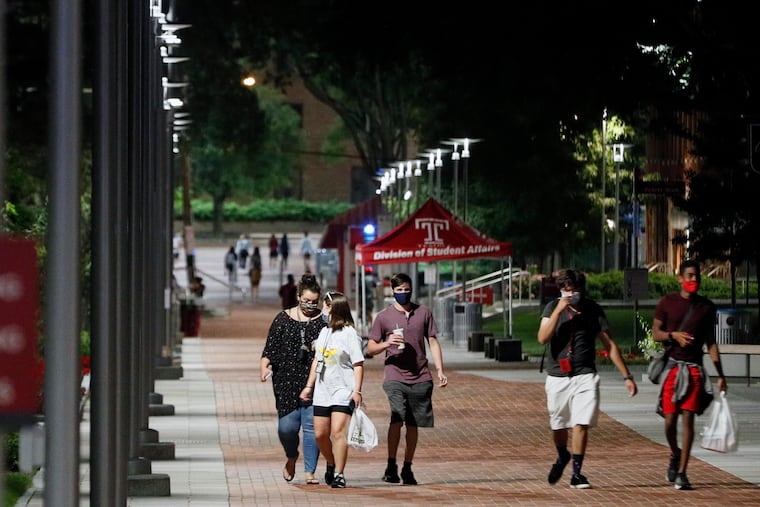Temple cases rise, two more universities pause classes; Murphy says N.J. is prepared for the school year
Pennsylvania reminded residents that cases in schools and in facilities such as nursing homes are often a reflection of the spread of the virus in the local community, asking them to remain vigilant.

As public schools in Philadelphia opened the school year remotely, New Jersey Gov. Phil Murphy said Wednesday his state’s school districts are prepared to begin the academic year next week — whether remote, in-person, or hybrid.
Acknowledging that coronavirus outbreaks would likely happen in some schools, Murphy touted the state’s plans to handle cases, and said education officials have worked with districts to prepare. The majority of New Jersey schools, 434, are using a hybrid teaching model, 68 are fully in-person, and 242 are remote-only.
He and the state health commissioner previewed guidelines that schools will use to make decisions ranging from when to isolate a child to when to close the school, and Murphy said he would provide more details on the guidance Friday.
New Jersey reported 329 new cases and 11 deaths on Wednesday. Murphy said the state was also working on guidelines to address future outbreaks in long-term-care or nursing facilities, and said the state was continuing to prepare for a potential second wave. His administration plans to have stockpiled 98 million pieces of personal protective equipment by fall, he said.
» READ MORE: Philly students head back to class, virtually; education leaders demand more funding
Pennsylvania reported 816 cases and 21 deaths, and officials reminded residents that the actions of the broader community can affect whether outbreaks occur in schools and other congregate settings.
“We know that the cases in schools and in facilities such as nursing homes are often a reflection of the spread of the virus in the local community,” said Health Secretary Rachel Levine.
The worry echoes across the globe: As several countries, including Spain, France, and Turkey, deal with a resurgence of cases and many European children went back to school this week, one Spanish official predicted most children returning to the classroom in Madrid, the hardest-hit area, would likely get the virus from community spread.
The world is nearing 26 million confirmed cases and has recorded more than 850,000 deaths. The United States had confirmed more than 185,000 deaths and 6.1 million cases as of Wednesday. Brazil, the country with the second-highest number of cases and deaths after the U.S., was finally beginning to see a decrease in daily deaths.
The Centers for Disease Control and Prevention told states to be ready to distribute a vaccine by late October or early November, which raised questions among public health experts about state preparedness and funding — and about whether the Trump administration was rushing the timetable to politicize a vaccine rollout before Election Day, the New York Times reported Wednesday.
» READ MORE: Federal order protects many Pa. renters from eviction, though legal challenges may arise
In Philadelphia, city and university officials continued reckoning with the outbreak among Temple University students — and hoping it would not spread to the community.
Temple identified 85 more cases of the coronavirus among students so far this week, bringing the known total to 212 cases, according to the university. The majority of them were identified through testing by the city health department.
About 15% of the 400 students tested by the city on Monday had the coronavirus, said James Garrow, a health department spokesperson, a positivity rate that is considered indicative of an outbreak — meaning there are many more people infected than health officials know about.
The outbreak skewed Philadelphia’s daily case report; the city had 235 new cases and a positivity rate of 8.3% for test results reported Wednesday. Philadelphia’s positivity rate has been 5% or lower in recent weeks; last week’s was 3.7%. It has not been as high as 15% since mid-May.
The virus foiled other universities’ plans Wednesday, too: Holy Family University closed its main campus in Northeast Philadelphia after one campus member tested positive. All classes will be held remotely and the university will remain closed through Friday while Philadelphia’s health department completes contact tracing, a spokesperson said.
And Lock Haven University became the second Pennsylvania state university to move instruction fully online after reopening: It suspended in-person classes until Sept. 21 following an uptick in cases on campus, where 43 cases have been confirmed.
Testing for the virus continued at Temple on Wednesday, and city health officials are talking with the university about when to resume in-person classes, which are currently suspended until at least Sept. 11. Garrow said the university would not be able to restart classes until the outbreak slows.
“Like the Philadelphia Department of Public Health, Temple takes these results very seriously, and will continue to work with the city on reducing the number of active cases,” Temple spokesperson Ray Betzner said.
» READ MORE: Latest Pa. GOP attempt to strip Gov. Tom Wolf of his coronavirus emergency powers fails
And as another holiday weekend nears, some officials hoped to avoid case spikes like those seen after Memorial Day.
Montgomery County Board of Commissioners Chair Val Arkoosh, a physician, said she expects coronavirus cases to increase after Labor Day weekend and urged residents not to relax their safety measures over the holiday.
“Just because it’s a holiday from work, it’s not a holiday from the coronavirus. And in fact, if people are lax in their behavior it just increases the chances that coronavirus will get to work overtime on Labor Day,” Arkoosh said. “Keep those masks on, keep that social distancing, be very, very careful at any social gatherings, and do your best to not bring this virus back to our community.”
Staff writers Laura McCrystal, Erin McCarthy, and Ellie Silverman contributed to this article.